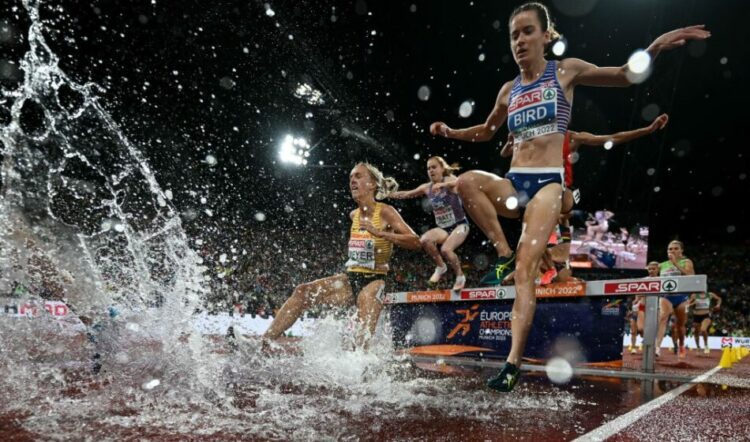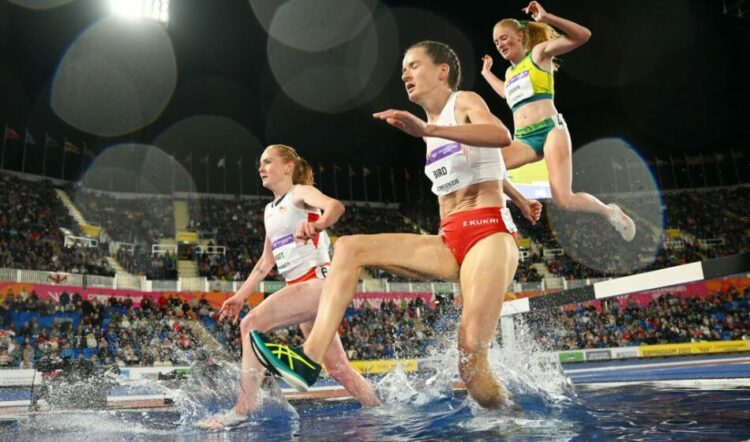The 3000m steeplechase British record-holder explains how she laid the foundations for an impressive year
As the rain lashed down on the streets of New York, European and Commonwealth 3000m steeplechase medallist Lizzie Bird brought the curtain down on her exceptional season with a personal best and a 10th place in the New Balance 5th Avenue Mile.
As most athletes contemplated end-of-season getaways to exotic locations, the 28-year-old was already focused on her return to law school at the University of Colorado Boulder. Having twice deferred her start date – first due to the 2019 World Championships and then to accommodate the delayed 2020 Olympics – the Public and International Affairs graduate (Princeton), who also has a Masters in International Studies (University of San Francisco), is now in her second year and in the form of her life.
“I think having those two years to really focus on running has pushed me forward this past year,” says the British steeplechase record-holder, who smashed her personal best with 9:07.87 in the Monaco Diamond League in August.
“I think the main thing is that I’ve had pretty much consistent training and no injuries since 2018. During my last few years at Princeton and my Masters, I had quite a few injuries, so although I was progressing, my training kept being cut short.
“With a bit of consistency, I’ve just been able to build and build each year in terms of volume, and the quality of my sessions just gets slightly better each year. I’ve had some time to just fully focus on running and it’s allowed me to really figure out what my body could and couldn’t manage, as well as getting the recovery right.
“I don’t think I’ve done anything particularly different [in training] this past year, although a big change has been living at altitude for the first time. I think that’s worked really well for my body, for whatever reason.”
Bird was disappointed not to make the final at the World Championships in Eugene, but together with podium performances in Birmingham [silver] and Munich [bronze], in addition to a lifetime best that ranked her ninth fastest in the world this year, it has added fuel to the fire.

Lizzie Bird (Getty)
“If someone had said I’d have a rubbish race at Worlds but do really well at the Euros and Commonwealths, then I’d have been like, ‘okay, that’s fine’,” she admits.
“I definitely thought going into this summer that a medal at the Commonwealths and/or Europeans was possible, but I didn’t think I’d run 9:07. I think having that kind of race and just being really competitive against really good athletes in Monaco, not just running the time, has given me confidence that I could do that again or do something similar at a major championships – and we’ve got a few of them coming up.
“It’s really nice we’ve got another Worlds right away [in August of next year], so I’ve got a chance for redemption quite soon. I think going into the Worlds this year it was sort of expected I would make the final and pretty disappointing when I didn’t, but that makes me hungrier for next year.”
Bird has excelled in 2022 and, in parallel, her international profile has grown substantially. Domestically, thanks in part to her on-track rivalry with former British record-holder Aimee Pratt, the profile of her event has also been raised. “I hope we get more girls and women interested in the steeplechase,” she says. “If we can get more depth then hopefully the momentum will continue.”

Lizzie Bird (Getty)
Typical training week
Bird is based in Boulder and is coached remotely by her former college coach in San Francisco, Pat McCurry. “I stuck with him. It was just one of those things, if it’s working, then why change it?” she says.
She trains mainly alone but is joined by a law school classmate (a former triathlete) for some of her track workouts and long runs. Her average weekly mileage in the winter is 50-60 miles and is typically off six days with rarely any doubles.
Bird’s barrier work throughout the winter is minimal, but more hurdle-specific sessions will be introduced throughout spring and into summer.
Monday: easy run (40-50min), speed development drills and weights. “More and better-quality strength and conditioning sessions have contributed to my progress over the past year,” she says. “My strength coach [Maj Skok, based in Leeds] writes me a really good programme which is quite steeple-specific. He’s also added in more plyos and box jumps this year, which I hadn’t really done before.” Occasionally a very easy double run or cross train (30min).
Tuesday: session (in winter, sessions will alternate between hills, fartleks, tempo runs and short track reps; in spring/summer, there will be one longer session and a track session; and in summer, both sessions will often be on the track, or one pre-race track session and a race).
Wednesday: easy run (40min), cross train, or rest day (cross train – for example, swim, bike or elliptical).
Thursday: medium-long run (60-80min) and weights.
Friday: session (as above).
Saturday: either easy run (40min) or cross train or rest day, depending on Wednesday. “The cross training might be quite a long bike ride during the winter which has added to my overall aerobic capacity this year,” she says.
Sunday: long run up to 1hr 45min (during the winter).
Note, the programme will change to accommodate races in the summer.

Lizzie Bird and Aimee Pratt (Getty)
Favourite session
“Anything on the track, especially in the spring when we do more of the faster sessions. One that we’ll do each spring is 3x600m with 10min rest in between, so I’m wearing spikes and going pretty much all out by the end. It’s the closest to racing that I do in training, and I like racing, so I enjoy it.”
Least favourite session
“Tempos, unless I’m really fit and they feel easy, which is extremely rare!”
» Read more in our ‘how they train’ series here
» To subscribe to AW magazine, CLICK HERE














